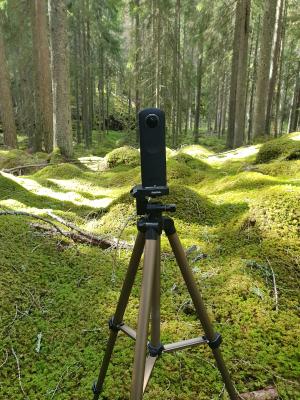Methods
Creating virtual environments

With a 360 camera and an audio recorder, I photographed and recorded audio from a natural forest, a spruce plantation and an urban city. The photos were taken during similar weather conditions. The three photos were edited in Photoshop to remove the tripod at the bottom of the image and to remove any traces of chromatic aberrations that appeared on the image from the camera’s optics. The photos and audio recordings were edited together into five-minute videos which were then played in an HTC Vive VR headset.
Experimental protocol

31 healthy participants were recruited for the study and randomly divided into three test groups, one for each environment. One person was tested at a time, and the participants were not allowed to know which of the environments they had been randomly assigned to.
An electrocardiogram and galvanic skin response were recorded throughout the entire experiment to record stress levels. From the electrocardiogram, the participant's pulse (beats per minute) and heart rate variability (root mean square of successive differences in ms) could be calculated. Skin conductance level (µSiemens) was calculated from the galvanic skin response. These measurements are indicators of activity in the sympathetic and parasympathetic nervous systems.
The experiment had three phases:
- Baseline phase, (1 min) recording of baseline normal state levels.
- Stress phase, (5 min) stress was induced using mild electric shocks and loud noises.
- Recovery phase, (5 min) participant recovered from the stress phase by watching a video of their assigned environment in the VR headset.

Responsible for this page:
Director of undergraduate studies Biology
Last updated:
05/15/21
